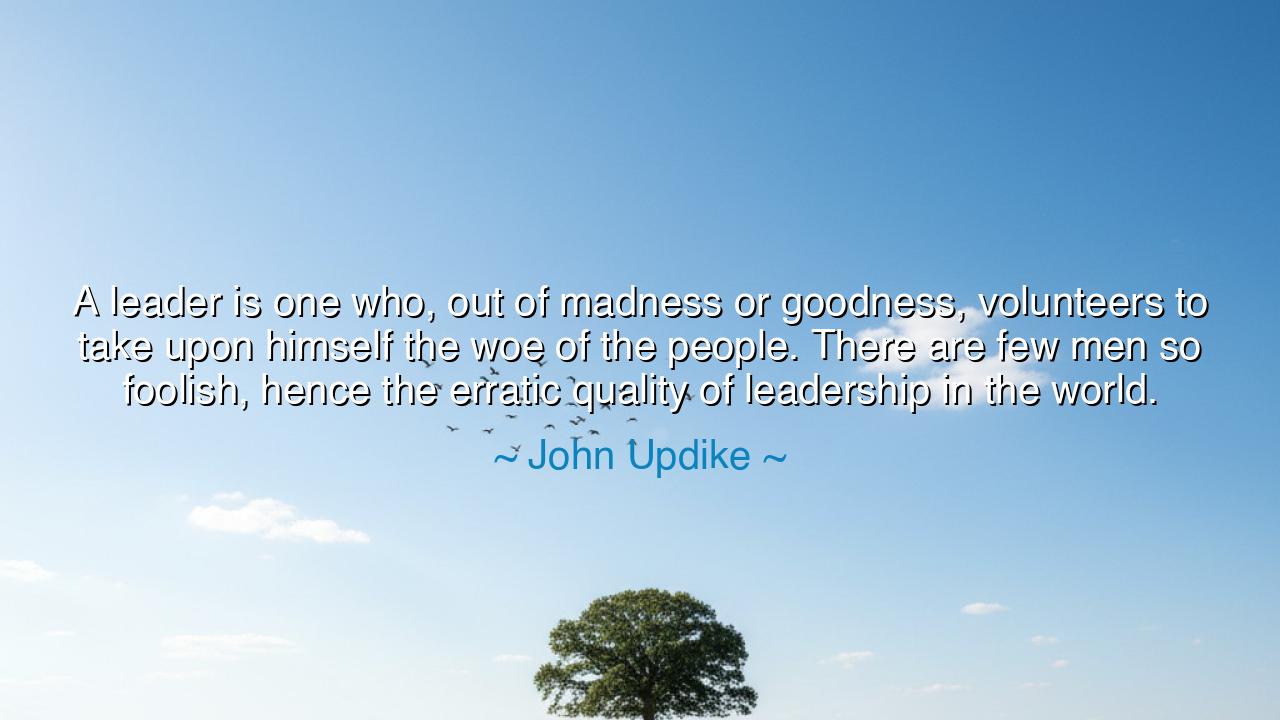
A leader is one who, out of madness or goodness, volunteers to
A leader is one who, out of madness or goodness, volunteers to take upon himself the woe of the people. There are few men so foolish, hence the erratic quality of leadership in the world.






Hear now the profound and sorrowful wisdom of John Updike, the keen observer of the human soul: “A leader is one who, out of madness or goodness, volunteers to take upon himself the woe of the people. There are few men so foolish, hence the erratic quality of leadership in the world.” In these words lies a revelation as old as civilization itself — that true leadership is not born from ambition, but from a sacred burden, a calling that demands both courage and sacrifice. For to lead is to bear not only one’s own pain, but the pain of all. It is an act so selfless — or so irrational — that only the purest hearts or the bravest fools dare undertake it.
Updike, a man of letters and insight into the frailty of mankind, spoke not as a politician but as a philosopher of the human condition. He saw that the world has never lacked those who desire power — but few who seek responsibility. Many crave the throne, but few are willing to carry the sorrow that comes with it. True leaders, he reminds us, are those rare souls who step forward not for glory, but because they cannot bear to watch their people suffer in silence. Whether out of compassion or out of a restless, consuming fire of purpose, they place themselves between the world’s wounds and the world’s despair. And this, he calls a form of madness — for who in their right mind would choose such a cross?
From the dawn of time, every great leader has carried this mixture of goodness and madness. Consider Moses, who led his people out of bondage. He did not seek power; he fled from it. Yet when the cry of the enslaved reached his ears, he returned to Egypt, trembling yet resolute. He bore their woe for forty years through wilderness and rebellion, until his own strength faded in the shadow of the Promised Land. Or think of Abraham Lincoln, who walked through the dark valley of civil war. His heart, heavy with the sorrow of divided kin, broke under the weight of unity’s price. He led not for pride, but because his conscience gave him no rest. This is the madness of compassion — to shoulder a burden too vast for one man, simply because it must be borne.
Yet Updike’s words carry also a warning: because few are willing to make such a sacrifice, leadership in the world is erratic — unpredictable, fragile, and often corrupt. When noble hearts are too few, the ambitious and the cruel rise in their place. Those who crave power but not pain rule without mercy; they seek not to heal, but to control. And so history swings like a pendulum between the selfless and the selfish, between the shepherd and the tyrant. The world is governed not by steady hands, but by the trembling grasp of flawed men — some too mad with pride, others too good to survive the weight of their own virtue.
This is the tragedy and the paradox of leadership: that the best are often broken by it, while the worst are strengthened by it. Yet still, the world endures because a few — a precious few — continue to step forward when no one else will. Their names may fade, their victories may crumble, but their spirit remains the cornerstone of humanity’s hope. For even one soul who chooses service over safety redeems the weakness of a thousand cowards.
O children of tomorrow, let this be your understanding: to lead is not to rise above others, but to kneel before their pain. If you would be a leader, prepare not for honor, but for hardship. You must carry the doubts of the fearful, the anger of the oppressed, the weight of the ungrateful — and still move forward with faith. Your strength must come not from praise, but from purpose. The madness within you must be the holy kind — the fire that burns for justice, the refusal to stand idle while others suffer.
And when the world tempts you with the easy path, remember that true leadership is never easy. It is the choice to walk where the ground trembles, to stand where the arrows fall. Yet know this also: though few take up this burden, those who do give light to the ages. Their goodness, mingled with their madness, keeps the world from collapsing into despair.
So, my children, do not seek power — seek meaning. Do not crave the throne — crave service. And if destiny calls you to lead, accept it not with pride, but with humility. For in that moment, you will join the brotherhood of those rare and luminous souls who, though wounded by the world, choose to heal it still. Such is the sacred folly, and the eternal glory, of true leadership.






AAdministratorAdministrator
Welcome, honored guests. Please leave a comment, we will respond soon